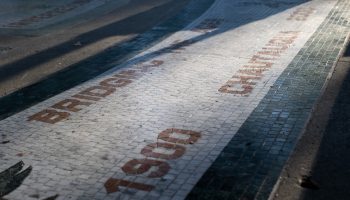
At 2 p.m. today in Bratton Theater, Chautauqua Theater Company will deliver the final performance of its mainstage production of Execution of Justice. The play, written and directed by Emily Mann, centers the trial of former San Francisco city supervisor Dan White after he killed former mayor George Moscone and former city supervisor Harvey Milk. Today’s closing show is the 17th performance of Execution of Justice since the first preview on July 12.
All nine of this summer’s CTC Conservatory Actors are in Execution of Justice, in addition to three guest artists. For the actors, taking part in such an intense, artistic drama can be simultaneously challenging and exciting.
For David Bertoldi, a member of the conservatory, finding a way to reconcile his personal disapproval of his character while also immersing himself in the role is key.
“The challenge that I found in the process was playing this person who was fighting for something that I personally don’t believe in or don’t agree with,” said Bertoldi, who portrays White’s defense attorney Doug Schmidt.
“It was a challenge and a constant hurdle to be working through with (Mann), who was always pushing me to put aside my own judgment.”
Despite these challenges, Bertoldi said this has been “the most artistically satisfying and fulfilling project” he has worked on in a long time.
For Ayla Decaire, a conservatory member, the most challenging part of the experience has been learning to take care of herself amid the intensely emotional role of White’s wife Mary Ann.
“One of my main goals when coming here for conservatory was to work on advocating for myself or asking for help if I need it,” Decaire said. “… This was the perfect opportunity for me to figure out how to do that.”
Conservatory Actor Julien Alam, who takes on several roles in Execution of Justice, said he finds it important to honor the individuals who lived through the assassinations and subsequent trials.
“The fact that these are real people and real words means that the motivation I have to go out on stage everyday is so much deeper and more rooted in a purpose. … It is my job to honor these people who did go through really horrible, traumatic things,” Alam said.
Decaire said she draws on her own experiences and sees the process of discovering a new role much like sculpting; she chips away from the material in order to uncover the pieces of herself that align with the person she is embodying.
“I think that whoever it is exists in me, so I can show you who that is, and it just takes some bravery,” she said.
Conservatory Actor Bailey Lee didn’t personally live through the events portrayed in Execution of Justice. But as an actor, she finds herself drawing on other experiences she did live through in various social movements to find her personal approach to the play. For her, it’s a method of better immersing herself in her characters.
“Loss is universal, want is universal, betrayal is universal, love is universal. I might not know what it was like in that specific historic context, but I know that, and that’s what I’m sharing and hopefully transcends,” she said.
Lee said she hopes audience members will bring their own lived experiences and perspectives to the performance for a broader conversation that transcends the specific historic event of the trial.
“Whatever heartache comes up in this moment in the country and in our lives, let’s bring that into the room, and let’s talk about that and learn or grow something from this historic perspective,” Lee said.
Each season, CTC brings a selection of young actors to the conservatory program who receive formal training in theater and professional experiences in both the New Play Workshops and mainstage productions.
“(Being in the conservatory) is growing in me a real respect for the artform and a real respect for the discipline and the sacrifices and the heart and brilliance,” said Lee.
For many of the actors, CTC’s conservatory program has afforded simultaneous professional theater development and formal acting training for the current Master of Fine Arts students.
“It’s a very unique position to be in where you’re having the best of both worlds of being in a show and having the support when you need it,” said Conservatory Actor Anina Baker. “I feel like that transition to the fully professional world is smoother — it’s not as big of a shock. It doesn’t feel as scary because we’ve had both. It feels like an in-between step that we have the privilege of having when other people don’t.”
CTC’s emphasis on new works and emerging artists is particularly evident through the conservatory as the actors are in the early stages of their professional careers. For them, it is exciting to watch one another develop their artistry and learn from each other, having all come from different backgrounds and educational programs.
“What’s really special about being in the conservatory, in particular, is that it’s nine of us all from different schools and different graduate acting programs getting to know people doing the thing that I have been doing in the places that they’re doing it — making that network, expanding the network laterally,” Bertoldi said. “These are colleagues and peers, people I’m going to want to be working with for the rest of my career.”
For Alam, the most appealing part of CTC’s conservatory program was the emphasis on new work and working with emerging artists.
“I think the emphasis they put on emerging artists at every level and in every discipline of the theater was really inspiring to me, and it’s just something you don’t see so often anymore,” he said.
Lee said she has seen her personal development manifest in both her artistic practice and specifically through the experience of Chautauqua being immersed in the Institution’s programming.
“I feel so artistically fed by the people that I’m getting to work with,” she said. “I feel like it is a season of exponential growth — both within my art form and also because we’re in Chautauqua.”
Alam echoed the sentiment, emphasizing the engagement of Chautauquans and their willingness to interact with art as playing a developmental role in his craft.
“I am so grateful for how much Chautauquans interact with us and care about what we’re doing,” Alam said. “I hope that they know that that is a huge part of the learning that we’re doing here in the conservatory is seeing how they react to things we present and getting to talk with them after shows.”




